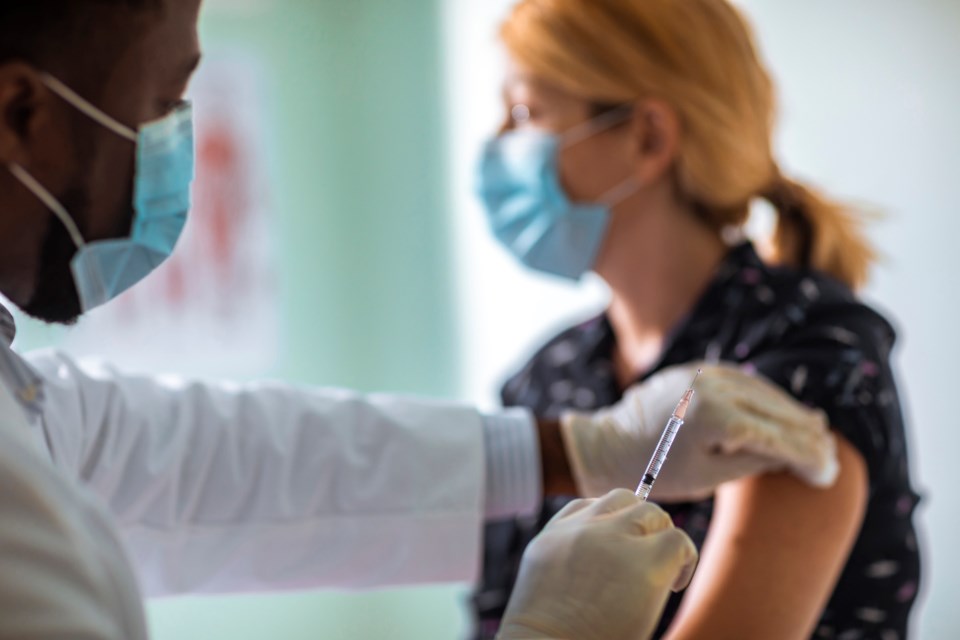Ontario’s government has introduced a vaccine mandate for health and education workers, though the policy allows unvaccinated workers to submit to regular testing as an alternative.
The mandate was part of a suite of policies announced Tuesday that the government said were necessary in the face of the more transmissible Delta variant.
Along with the vaccine mandate, those policies include expanding eligibility to the vaccine to children turning 12 this year, approval of third vaccine doses for those at higher risk, and a pause on further relaxation of public health restrictions.
The vaccine mandate will require public sector employers in settings the government called “high-risk,” including hospitals, long-term care homes, ambulance services, to develop vaccination policies effective by Sept. 7.
At a minimum, the policies must require workers and contractors to provide proof of vaccination or a medical reason for not being vaccinated, or to undergo regular antigen testing, along with an education session on vaccines.
The province will also implement similar vaccine mandates for staff in public and private schools, post-secondary institutions, women’s shelters, and group homes, it said.
Minister of Health Christine Elliott said the steps were necessary to ensure a safe return to school and protect against a fourth wave that could again threaten hospital capacity.
“While Ontario remains a leading jurisdiction for first and second doses administered and we have the infrastructure in place to manage outbreaks, the Delta variant is highly transmissible and the experience of other jurisdictions shows we must remain vigilant as we head into the fall,” she said.
In a statement, leader of the Official Opposition NDP Andrea Horwath said the new policies didn't go far enough.
“We urgently and desperately need to put the safety of children first, protect vulnerable people, and stop the spread," she said. "No unvaccinated person should be in a classroom or health care setting.”
Organizations like the Ontario Medical Association and Registered Nurses' Association of Ontario have called for a vaccine mandate in health care settings, but at least one union is wary of punitive policies around vaccines.
Andy Savela, director of health care for Unifor, called Tuesday's announcement frustrating, worrying that public sector employers can also implement more aggressive policies that go beyond provincial requirements.
“We're very pro-vaccine," he said. "We just worry about the environment that’s going to be created… I think it puts the workplace in a situation where there’s going to be a lot of divisiveness and turmoil.”
The union had been calling on the province to implement a comprehensive strategy to address vaccine hesitancy for months, he said. Unifor itself had found education-based approaches, such as offering workshops with health experts, to be effective.
“I think that’s the approach we should have started with when the vaccine first became available," he said. "You have to question, if this is where the province and its medical officials were going to go, why do it so late in the game?"
He also worried vaccine mandates could worsen staff shortages, particularly in long-term care, where there is already a staffing crisis.
Tuesday's announcement also saw the government approve third shots for those at higher risk from COVID-19, including transplant recipients, patients undergoing treatment for some cancers, and residents of “high-risk congregate settings” like long-term care homes.
Third shots could begin as early as this week in some health units, the province said.
Eligibility for the vaccine will also be expanded to anyone born in 2009, meaning those who will turn 12 later this year can get the shot as of Aug. 18.
The decision came after data from other provinces that took the step identified no risks, said Ontario’s Chief Medical Officer of Health, Dr. Kieran Moore.
The province will also remain in step three of its reopening framework until further notice, the government announced, leaving capacity limits and other current restrictions in place indefinitely.
